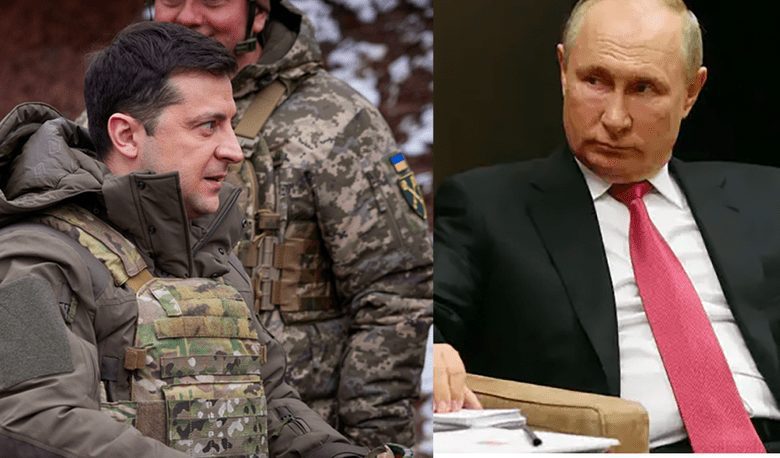Civil Leadership
What we can learn from the battle for public leadership: Putin versus Zelensky
Context matters for leadership: dictatorship versus democracy

The war Russia started in trying to conquer Ukraine has sparked another battle on the thus created scene: a battle for public leadership. This is now a worldwide, public battle for many and different international audiences between the two leading politicians: Putin versus Zelensky. Now everybody in the whole world is an expert (often after having had the same role in the battle against the Covid19 virus) in public leadership by observing, commenting and trying to follow these two new leaders on the public stage. Which one do I believe? On which side am I? What do I think of and feel about their words, their message, their style and performance? What do I think are their best and worst rhetorical skills and, especially, what convinces me the most?
Disruption of democracy
These observations and opinions are very close to the analysis in my book of 2018: ‘Civil Leadership as the Future of leadership. Harnessing the disruptive power of Citizens’ (Amazon 2018). This analysis shows how the new digital- and media technologies have fundamentally changed the public arena, the public debate and so, public leadership. In the conclusion I explain how this will affect democracies, democratic institutions, politicians and political culture. In this book Zelensky was one of the examples of disruption of the core function of political parties in this new arena. Individual media performance and support are putting pressure on political parties to nominate these public figures as a candidate. This then disrupts their core task of recruiting and selecting candidates for political functions. Publicly having many followers, a celebrity status and, in his case, an actorship in a famous television series, in which he had the – convincing – role of a hero in national distress, all these factors gave Zelensky the success of being elected as president of Ukraine. Coming from outside current political circuits, he was of course most of the time not supported by incumbent politicians. That is why I call this disruption of the main function of political parties. In my view this battle between Putin and Zelensky shows that my analysis is strongly influenced by the political context and culture of (Western) democracies. I already saw that in my international lecture tour in 2019 during which I visited mostly these kind of countries, like the Scandinavian countries, New Zealand, Canada and USA. In my lectures I began to call it a fundamental problem in my analysis: an ‘OECD countries bias’. This new battle for public leadership, under very harsh and violent circumstances, proves this further.
Any leadership expert will ask three questions about this public battle and stage
- The first category of questions is about the above: How much and what kind of impression and impact do they have on their audiences (and vice versa)? Questions like: How do they perform? Who wins the most public authority? What kind of rhetorical skills is used by each one of them? What kind of medium is their favorite and for what reason? And the more modern questions: Are they listening to their audiences? Do they learn something from their reactions? Are their policies and political decisions becoming smarter due to these interactions? I know, these second kind of questions seem not relevant for a dictator and only reveal my background in a democratic context. I name them here because you still never know what kind of audience these leaders are addressing and needs to convince of their public leadership. One of the mistakes many comments in the West make, is that they take the formal constitutional context as dominant in the whole context and agenda of these two leaders. But formality is not social reality. Maybe the audiences Putin addresses in their hearts want to be more democratic and the other audience, the one that Zelensky is addressing, wants to be more hierarchical and is ultimately ‘strong man’-oriented. Your impression and impact as a public leader has everything to do with reading your audience well, even if it goes against your position or even your own values!
- The second category of questions is more about the underlying factors that explain what the audience sees. How can we explain these differences between them? Is it a personal character issue, a personal preference, a psychological or biographical background that explains this line of development of their leadership? Or is it due to the governance context they are operating from? One being a dictator with a small elite around him (and maybe many enemies we don’t know of and he wants to hide?) The other being a leader in a democracy, and with a very modern and fitting background in actorship and media performance, also very relevant in his political status. Or, maybe, it is even due to technological expertise and facilities why one uses big podia and well-rehearsed audiences or very formal studio settings (Putin) and the other informal settings, on smartphone cameras and no studios at all (Zelensky)?
- The third category of questions is much more beyond these theatrical performances, about political strategies: What is their political agenda? Are they reaching their political goals by these performances? Are they rallying the right political support with these messages, performances and public results? This is a kind of reversal of Von Clausewitz’s famous words: ‘War is merely the continuation of politics by other means’. In this case we ask: How can we get back from war to politics? These questions are about the politics beneath the war, but also about what kind of politics can end the war. In this third kind of questions I see the biggest difference between the dictator (and aggressor) and the democratically elected politician (and victim). The public performance of the dictator is not about convincing his direct audience, but about – indirectly, via these performances and these artificial audiences – convincing the circles that make his power base: his political supporters, the political doubters and certainly his political enemies, nationally and probably, although they don’t influence his direct power base, abroad. I even think he is not even realizing he could (and maybe he should if he wants to win the war?) also try to persuade the Ukrainian people of his good intentions, his right analysis and the trust they should have in him. In my view both ‘players’ are trying to achieve their political goals and the basic question should be: Which one of these public performances are helping which one of them the most in his political agenda?
The battle for the eyeballs
The new ICT- and media technology has made our world much smaller and has laid all big events involving humanity directly and almost live on our doorstep. These events are now part of every individual’s living, thinking and experiencing his/her life. But it also influences our public communication about this new world agenda, our public debate and opinion and the conversation we have about these. In this new vision on and emotional connection with the world this public battle over public leadership between Putin and Zelensky is now center stage. In the #battlefortheeyeballs they have won our attention.
In the new media landscape we can now see very clearly the connection between the open media channels of internet and the public itself and democracy. The one (uncensored bottom-up use of internet) needs and stimulates the other ((direct) democracy). We can see this here because Zelensky uses them much more intensely. Putin on the other hand tries to censure the internet and social media channels, as he also does with censuring and threatening the classical media.
Concluding
This battle on the public stage shows that we in the Western democracies are now trained and used to a totally new public arena, as shown in my book of 2018. This influences how we, as Westerners, see and value different types and styles of public leadership. This also shows how our fundamental way of looking is influenced by our political context. We not only see what we are used to see, but also what we want to see. This in itself also influences our appreciation of public leadership. It now certainly looks like we support Zelensky the most, not only because we reject the war and aggression of the Russians, but also because we recognize and admire his public skills.
The more objective and scientific observations and analysis would be if we can see and explain what kind of public leadership Putin is performing. That forces us to look beyond our current training and frame of looking. It then teaches us what kind of premises are behind our way of looking at and judging of public leadership. Only then are we in a position to explain and judge Putin’s public leadership. Many comments I now hear about Putin’s performances are naively based on this modern Western way of looking at and judging of public appearances. The most obvious symptoms of this naivety can be seen in the comments about Putin’s ‘character’, ‘paranoia’, ‘autism’. It is childlike to judge the ‘evil person’ (in your eyes) as a ‘bad’ person in psychological terms! Only after this fundamental search into our own prejudices, can we strategically and politically really judge Putin’s public leadership. The main question being if he is showing the right public leadership in skills, staging and messages in his arenas and with the audiences that are most relevant for him politically.
The basic factors that define these political contexts are:
- Dictatorship versus Democracy
- Power of Position versus Authority of Public Performance
- Threat of violence (including your own audiences) versus defense of values and country (including inspiration to sacrifice yourself)
- Tell sell (Dictator knows best) versus Followership
Let’s hope this battle about public leadership will help end this war and return to good old politics.



